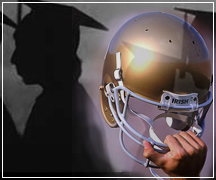
Notre Dame offensive lineman Dan Santucci would like to play professional football after this season with the Fighting Irish.
But if the football thing doesnt work out, Santucci has prepared himself to make use of his bachelors degree in marketing and the additional skills hes picked up in computer application classes this fall.
He attributes part of that preparation to a relationship he struck up with marketing professor Kevin Bradford as part of an honors program established by the Office of Academic Services for Student-Athletes (ASSA).
He always said, Work hard, keep doing what youre doing. Always keep your options open,says Santucci, who met with Bradford through last academic year while he was still an undergraduate.
It was just a great chance outside of football to talk to faculty, to get their opinion on school material and the outside world,says Santucci, who valued the opportunity toget to know a faculty member kind of as a friend.
The honors program is composed of * student-athletes who are achieving both in the classroom and athletic venues. The goal is to provide * them with an opportunity ** to experience a faculty/student relationship in a unique and meaningful way.
Student-athletes are paired with faculty mentors and usually meet in informal, no-pressure, one-on-one sessions.
The mentor can help guide these exceptional students to opportunities for internships, research, scholarships and future jobs,says Laura Kerls, who administers the program for ASSA.They also may simply be a person the student-athlete can talk to. The personal relationships that develop are essential to making this program successful.
Fencer Rachel Cota worked last year with anthropologist Daniel Lende, who helped her identify an eight-week summer service program in Africa that she says was a life-altering experience.
ASSA is charged with supporting and challenging * all student-athletes as they strive for * academic success. A few of the services offered through ASSA include ** tutoring, time management and monitored study halls.
S ometimes these students are so focused on their sport and academics, they dont make the time to develop relationships with faculty. Their time is so structured,says Kerls.
On the faculty mentor side, the program attracts an amazing array of professorial supporters whose participation bears the truth of the saying:If you want to get something done, ask someone whos busy.
I think the best thing we can do for students is sit down and talk with them one-on-one,says Mark Roche, OShaughnessy Dean of the College of Arts and Letters and a concurrent professor of philosophy and German.Roche mentors track team member Michael Popejoy.
Forty student-athletes are paired with mentors, whose ranks include John Affleck-Graves, executive vice president and finance professor; Dennis Jacobs, associate provost and chemistry professor; and Frances Shavers, executive assistant to the president.
Popejoy sought out Roches support, while Santucci relied on the program administrator to do the matchmaking. That is how physics professor Malgorzata Dobrowolska-Furdyna met soccer player Matthew Besler. She teaches physics to pre-med students, and he wants to go to medical school.
It fits nicely. I know more or less where theyre going and what they need. And its fun,says Dobrowolska-Furdyna.These are smart kids. Theyre hard working. Its a pleasure to be part of their success story.
Valerie Sayers, acting director of the Office of Undergraduate and Post-Baccalaureate Fellowships, recently met with six honors program students whom Kerls says are interested in post-graduate fellowships.
I just thought they were magnificent,says Sayers, who helps students apply for such fellowships as the Rhodes and Marshall Scholarships and Fulbright awards.
Noting that the student-athletes included sophomores and juniors, Sayers added she was pleased the fellowship office would be able to meet with them early.
All are potentially strong candidates for fellowships,she said.
TopicID: 20502